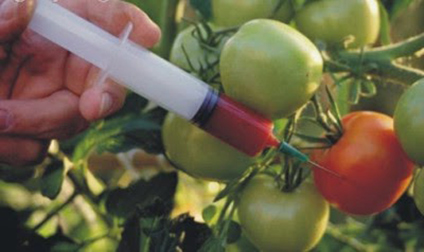Our daily dose of poison
Carbide, formalin, plastic.... toxic substances added
to the food we eat are killing us one meal, one snack at a time :
by Carol Aloysius
|

Pic - wellnesslabinfo |
Food borne illness from agro chemicals and other avoidable toxins
have taken a giant leap forwards in recent years. So serious is this
public health problem, it has prompted the World Health Organisation to
appeal to its member countries to address the issue immediately. Worse
still, if one goes by sheer numbers, it is set to overtake all other
avoidable diseases in the future. This is hardly surprising if you
consider how rapidly toxic the worldwide food industry has become.
All of us are victims gripped within its toxic net. No matter how
hard we try to break free, the ugly truth is that from farm to table,
the food chain is literally seeped with poisonous agents likely to send
us to an early death.
Take the fruits you love to eat. In the past our parents simply
plucked them off their trees and ate them without fear. Can we do the
same today? The same goes for our vegetables. Grown in increasingly
polluted environments, and heavily laced with pesticides and herbicides
as well as carbide, they account for the increased number of patients
being hospitalised for food poisoning in the country.
Carbide, widely used in the Indian subcontinent, which labelled
'carbide hub of the world', is now increasingly being used by Lankan
farmers. To quicken the ripening of their harvest, farmers apply carbide
directly on them even soaking the fruits for a long period, so that the
poison seeps into the fruit. "No amount of scrubbing or washing with
soap and running water can get rid of the poison inside the fruits and
vegetables that have pesticides and carbide sprayed on them," says
Director, National Poisons Information Centre, National Hospital, Dr
Waruna Gunathilaka, explaining that the only way to minimise this danger
is to wash them with running water, peel their outer skins and in the
case of vegetables, cook thoroughly instead of eating them raw.
Equally dangerous is the current practice by farmers to use pesticide
on their crops during the pre-harvest period, so that yams like manioc
and bathala come out easily and without breaking. If you do eat these
yams boil them well after removing their outer skins, Dr. Gunathilaka
advises.
Threat
|

Dr Waruna Gunathilaka |

Chandrika Thilakaratne |
In short, almost every food we eat today, poses a serious threat to
our lives. And that goes for food that is cooked, or processed and
packed as well. For, along with agro chemicals new toxins have entered
our food chain compounding an already grave problem.
Formalin, which it not a food ingredient is one example. Used widely
in India and Bangladesh, has prompted serious research.
According to The Agency for Toxic Substances & Disease Registry (ATSDR),
formalin in food and water can rapidly enter the body via the digestive
tract and body. The research warns that once inside the body, it is
rapidly broken down into new chemicals, which can affect the
gastrointestinal tract.... with children and women being more
vulnerable.
A study in 2014 published in the Journal of Environment Science,
Toxicology & Food Technology, drawing on outcomes of experiments on mice
claimed, "In Bangladesh formalin has alarmingly increased, especially in
fish, fruits and other foods, exposing the population to severe health
risks, that could affect the kidney and liver tissues and cause
degeneration of tissue and congestion of renal glomerulus, along with
renal tissue damage."
Check
for formalin in curd
Turn the pot upside down.
If the curd stays firm and the contents don't spill out
don't buy it. If the coating (yodaya) on top is so thick
that the curd can be cut into slices, don't buy it. Also
look for the date or expiry.
If it has a long shelf
life of several months - sometimes as long as 6-9 months, it
is bound to be laced with plenty of formalin to give it a
long shelf life.
Plastic
in food
Ever heard of plastic
being used to thicken and toughen those popular bites you
eat?
Then here's what you
should know.
Plastic bottles are now
being used as thickening agents say the heads of the Poisons
Information Unit and the Consumer Affairs Authority (CAA).
And the Director Information, Chandrika Thilakaratne admits
hearing rumours about manioc chips in particular being mixed
with plastic melted down from used bottles to retain the
crispiness and prevent it from breaking down easily, and
also extend shelf life.
"If a sample of a
suspect packet can be brought to us, it could be sent for
testing, so that the culprits can be dealt with,"
Thilakaratne said, adding that the CAA office is open all
day and urging the consumers to contact them on tel.
0112445897 or 0112432253. |
Based on these findings, the researchers ' strongly recommended that
formalin be banned from use in any food by the food industry".
Dr Gunathilaka fully endorses this stand on grounds there is mounting
evidence that formalin has indeed entered our food chain, and is being
used with ascetic acid in preparation of milk foods like curd.
Adulterated oil and refried snacks
Senior Food Inspector CMC Lal Kumara said food inspectors had found
most city food outlets to be selling short eats that were re-fried with
the same oil over and over again. "Re-frying can increase the fat
content and cause cholesterol and other diseases", Dr Gunethilaka
warned.
Vegetable oils especially palm oil mixed with coconut oil is also
being increasingly sold in food outlets according to the CAA and CMC.
According to CAA spokesperson Thilakeratne, at least 30-40 percent of
coconut oil in the market is adulterated with vegetable oil - mostly
palm oil. The CAA has urged the Health Ministry to make it compulsory
for bulk oil, which is the main culprit here, to be packeted and sealed
with addresses and expiry dates, as a solution.
Commenting on the health impact of ingesting food with such oil, Dr
Gunethilaka said palm oil in food can adversely affect the lipid
profile. "Those who ingest these foods can rapidly develop high fat
composition of the blood and high triglyceride levels which can lead to
ischemic heart diseases (heart attacks).
What we are seeing now is an increasing number of people being
exposed to this danger because both young and old are now into spicy,
salty foods like parata, kottu roti, papadam, fried rice and pastries,
which use this oil," he said, adding what was worse was that the vendors
often re-use this oil several times during the day, which causes a
dangerous chemical formation.
"These newly formed chemicals are injurious to human health. They
need to get rid of the oil after using it once," he stressed, pointing
out that road side food vendors also use cracked eggs for the food they
cook, which cost half the price of an ordinary egg. "Consumers can get
salmonella by eating these eggs if the shells are infected," he warned.
Discarded chemical/ pesticide containers
He said reliable information had been received that vendors of bulk
coconut oil were using large discarded chemical and pesticide
containers. "This is dangerous as the chemicals leech to the oil. The
country should have a system to regulate the use of empty chemical
containers and prevent them from being re-cycled for storing oil," he
urged
Lead
Another increasingly common and dangerous practice is the use of
newspapers to wrap cooked food and even meat. Lead in food can lead to
kidney damage, affect the neurological development (nerve), cause
abnormal thinking and rationalising, delay in menstruation in young
girls, and aggravate anaemia. "If a person has anaemia, lead absorption
is enhanced in the body system. Children with anaemia and pregnant women
are more vulnerable to this risk," Dr Gunathilaka said.
Although there is a minimum lead content regulation in the country of
0.3%, and most of our products have tested for much less levels of this
amount, he was of the opinion that no lead should be allowed in any of
the food through artificial means, as heavy metals such as lead could
damage the body's organs.
Preservatives in food
Flavours and preservatives are increasingly being used in cooked
foods to make them look and taste good and last longer. But are they
necessary? "No" said a health Spokesperson, suggesting we use natural
spices used in traditional cuisine like turmeric, cumin, cardamom and
pepper instead to give them their flavour.
MSG
One of the main flavour enhancers used in most processed and packaged
food is mono sodium glutamate (MSG). Added to noodles, fried rice and
other foods many however are unaware of the dangers that lurk inside
these seemingly innocent little packets.
"MSG is highly addictive. It is an excite toxin in the brain and
leads to the production of excessive amounts of dopamine, a chemical in
the brain that helps brain cells to communicate with each other.
An excess creates a drug like effect that provides a brief sensation
of well being, besides causing headaches, flushing of the face, allergic
reactions and gastro intestinal disturbances," pointed out Dr
Gunethilaka.
Although not banned, this particular flavour enhancer does have to
comply with certain regulations regarding its use, the latest being an
extraordinary gazette notification issued in February 2013, under the
direction of the Health Ministry, where several other food enhancers
were also included.
Laying down certain regulations regarding the use of flavour
enhancers in food, the new regulations made under section 32 of the Food
Act No 26 of 1980, specifically mentioned noodles and pasta (dry
products) in which such flavour enhancers were prohibited.
Yet products from the Middle east and China with no proper labels and
codes keep appearing on supermarket shop shelves.
The BIG question is why expose the public to the adverse impacts of
these toxins at all especially if our body does not need them?
More awareness raising programmes, to help food processors to
recognise mechanisms of avoiding the entry of chemical contaminated raw
materials to the food chain and minimise microbial contamination of
foods starting from sources of micro-organisms for stakeholders in the
food industry will pave the way for improved food safety in the future,
a senior Health Ministry official said. |

